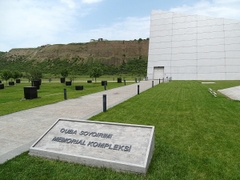Azerbaijan and Armenia have agreed to remove the clause related to unblocking regional transport routes, including the Zangezur corridor project, from the peace deal currently under negotiation.
On Wednesday, Elchin Amirbayov, the special representative of the President of Azerbaijan, said in an interview that this mutual agreement has eased ongoing negotiations, increasing the likelihood of swiftly concluding the peace treaty.
“On mutual agreement, we decided to take this paragraph out of the peace agreement and to refer it to a later stage. So, we decided to take it out of the text, but we can still reflect in the text [on] the fact that this is one of the other issues on which the countries may come back at some point to discuss and to come to a common agreement,” Amirbayov noted.
Armenian authorities, in turn, confirmed Baku’s statement regarding the removal of the regional communications clause from the draft peace agreement by mutual consent.
Ani Badalyan, spokesperson for the Armenian Foreign Ministry, noted that the effective opening of transport routes remains an important part of Armenia’s vision and agenda for peace and economic development.
Following the 2020 Second Karabakh War, Azerbaijan and Armenia initially agreed to unblock transport links, particularly direct route between Azerbaijan’s mainland and its Nakhchivan region via Armenia. The agreement aimed to enable international transport through the countries’ domestic infrastructure and foster regional connectivity.
Central to this agreement was the Zangezur corridor, which was expected to restore the direct connection between Azerbaijan’s mainland and its southwestern Nakhchivan exclave. Before the First Karabakh War (1991-1994), a railway connected Azerbaijan’s capital, Baku, to Nakhchivan. However, this crucial route was destroyed and looted during the occupation of Azerbaijan’s Fuzuli, Jabrayil, and Zangilan districts by Armenia.
Despite the initial agreement, Armenia later revoked its consent to open the Zangezur corridor, citing concerns over potential encroachment on its borders. In response, Azerbaijan shifted its focus and agreed with Iran to proceed with the construction of a multimodal route as an alternative.
In 1991, Armenia launched a full-blown military assault against Azerbaijan, which lasted until a ceasefire was reached in 1994. The war led to Armenia occupying 20 percent of Azerbaijan’s internationally recognized territories, resulting in over 30,000 Azerbaijanis killed and one million others expelled from those lands in a brutal ethnic cleansing campaign conducted by Armenia.
On September 27, 2020, the decades-old conflict reignited after Armenia’s forces illegally deployed in occupied Azerbaijani lands shelled military positions and civilian settlements of Azerbaijan. During the ensuing counter-attack operations that lasted 44 days, Azerbaijani forces liberated over 300 settlements, including the cities of Jabrayil, Fuzuli, Zangilan, Gubadli, and Shusha, from Armenian occupation. The war ended on November 10, 2020, with a tripartite statement signed by Armenia, Azerbaijan, and Russia, under which Armenia returned the occupied Aghdam, Kalbajar, and Lachin districts to Azerbaijan.
Shortly after the 2020 war, Azerbaijani authorities expressed their readiness and determination to negotiate with Armenia to bring long-awaited peace to the region. In March 2022, Baku proposed five basic principles to Yerevan, including mutual recognition of territorial integrity and border delimitation.
However, despite high-level meetings and dialogues, certain issues remain obstacles to the normalization process.
One major obstacle to finalizing the peace treaty is Armenia’s Constitution which has references to the Declaration of Independence posing territorial claims against Azerbaijan as it endorses the unification of Azerbaijan’s Karabakh region with Armenia. President Ilham Aliyev recently highlighted in his speech in Shusha, the Karabakh region, that as long as this clause remains in Armenia’s Constitution, a peace agreement will not be possible as constitution is higher than any other document, including an international treaty.
In June, Armenian Prime Minister Nikol Pashinyan noted that a peace treaty with Azerbaijan was nearing completion but stressed that Armenia would not agree to Azerbaijan’s demand for a constitutional change. On July 5, Constitution Day in Armenia, Pashinyan emphasized the need for a new constitution that reflects the will and vision of the Armenian people.
Meanwhile, Elchin Amirbayov believes that the issue is not about amending the Armenian Constitution under Azerbaijan’s pressure but rather about the Armenian electorate making a decisive choice.
“It's not about doing it [constitutional change] under pressure from Azerbaijan, but it's about you answering one question: Do you want peace or do you want a possibility for a new confrontation with Azerbaijan? If they [the Armenian authorities] put it that way, I think a majority of Armenian people who would participate in that plebiscite or referendum, I'm sure that they would support peace,” he said.
Highlighting the importance of a robust peace agreement, Amirbayov added that the main goal is to ensure that the peace treaty is unassailable, preventing any future revanchism or territorial claims against Azerbaijan.







 Azerbaijan has been recognized as one of the safest countries in the world, ranking 90th among 163 countries on the Global Terrorism Index 2025 (GTI).
Azerbaijan has been recognized as one of the safest countries in the world, ranking 90th among 163 countries on the Global Terrorism Index 2025 (GTI).
 The Azerbaijani Defense Ministry has reported ongoing shelling of its army positions by Armenian forces since last week.
The Azerbaijani Defense Ministry has reported ongoing shelling of its army positions by Armenian forces since last week.
 On Monday, Israel awarded gas exploration licenses to a consortium that includes Azerbaijan’s energy conglomerate SOCAR, bp, and Israel’s NewMed En...
On Monday, Israel awarded gas exploration licenses to a consortium that includes Azerbaijan’s energy conglomerate SOCAR, bp, and Israel’s NewMed En...



